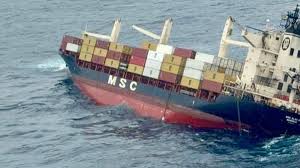Danger in the sea: On Kerala and the MSC Elsa 3 sinking.
India’s response to maritime disasters must be faster and better.
On the afternoon of May 24, MSC Elsa 3, carrying more than 640 containers, started tilting off the coast of Kochi, apparently due to an operational problem. The nearly three-decade-old ship was said to be structurally safe. The crew abandoned the ship after unsuccessfully trying to right her. Now, Elsa 3 is lying at the bottom of the seabed 50 metres below. As per the cargo manifest, officials say the ship had 13 containers with hazardous goods. Twelve had calcium carbide, a reactive compound, and one had “rubber solution”. Some 50 containers, many empty, were floating and getting tossed around by monsoon weather. Officials say the rubber solution has reacted with the seawater and accounts for the plastic pellets being found on the Kerala coast. Five containers with calcium carbide, another pollution hazard, are lying on the seabed and need to be safely disposed of before they cause damage. Some oil pollution has also been reported. There is as yet no clarity on how to safely dispose of the plastic pellets.
Though containers have tremendously boosted world trade logistics, oversight and control of what each container that passes several hands, ships and yards has is a global problem. Besides the 600-odd containers still lodged inside Elsa 3’s cargo space, some 365 tonnes of heavy fuel oil and 60 tonnes of diesel lie inside the ship’s tanks. That much of the oil has not seeped out yet is fortuitous but there is every possibility of it happening if quick action is not taken. The Chennai coast was ravaged by 250 tonnes of heavy fuel oil from an oil tanker that collided with an LPG carrier in 2017. MSC Elsa 3 is a toxic dump that needs to be quickly disposed of. Salvers are being engaged and they will follow international insurance protocols. The National Oil Spill Disaster Contingency Plan (NOS-DCP) names the Coast Guard as the nodal agency for such responses. In Chennai, the response was delayed by several days and there was much confusion and a lack of coordination between agencies. In Kerala, however, there has been enough time to rig up an effective response. With ambitious plans for economic growth that will inevitably lead to a surge in ship traffic, the government has also planned to draw more national and global transshipment traffic into India’s waters. India is only set to see a great number and variety of ships of varying cargoes on its coast in future. The Kerala response will show how well prepared India is to handle a major maritime disaster.
